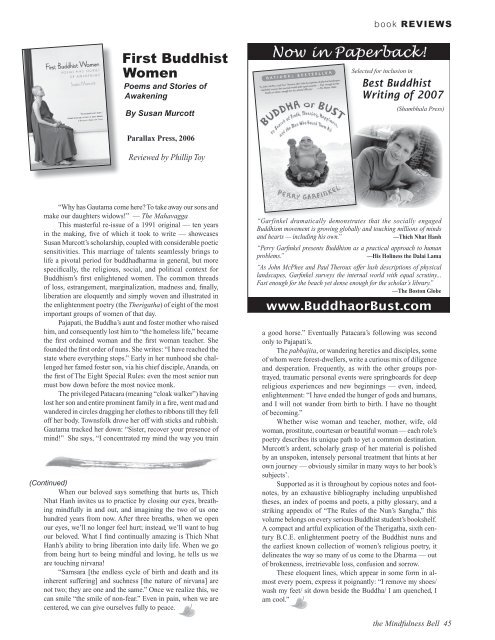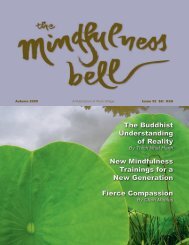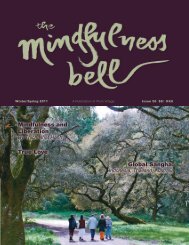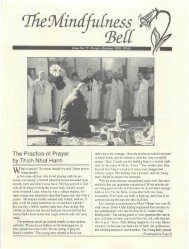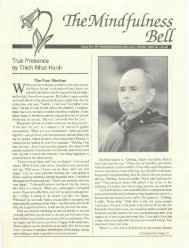ook REVIEWSJourney<strong>in</strong>gEastConversations onAg<strong>in</strong>g and Dy<strong>in</strong>gBy Victoria Jean DimidjianParallax Press, 2004Reviewed by William MenzaUnderstand<strong>in</strong>gOur M<strong>in</strong>dBy <strong>Thich</strong> <strong>Nhat</strong> <strong>Hanh</strong>Parallax Press, 2006S<strong>of</strong>tcover, 251 pagesReviewed by Judith ToyJourney<strong>in</strong>g East is an extraord<strong>in</strong>ary primer on the spiritual,psychological, and physical components <strong>of</strong> gett<strong>in</strong>g oldand dy<strong>in</strong>g — and liv<strong>in</strong>g a m<strong>in</strong>dful life. Author Victoria JeanDimidjian is a pr<strong>of</strong>essor <strong>of</strong> education at Florida Gulf CoastUniversity and found<strong>in</strong>g member <strong>of</strong> the Naples, Florida Community<strong>of</strong> M<strong>in</strong>dfulness. She has assembled a pr<strong>of</strong>ound and practicalcollection <strong>of</strong> <strong>in</strong>sights from Ram Dass, Frank Ostaseski,Joan Halifax, <strong>Thich</strong> <strong>Nhat</strong> <strong>Hanh</strong>, Michael Eigen, Rodney Smith,Sister Chan Khong, John Welwood, and Norman Fischer.In <strong>in</strong>terviews with Dimidjian these teachers transmit aremarkable blend <strong>of</strong> Eastern and Western wisdom. <strong>The</strong>y tell usthat to understand death or prepare for it we have to be deeply<strong>in</strong> touch with what is happen<strong>in</strong>g <strong>in</strong> the present moment, evenas the body dissolves.<strong>Thich</strong> <strong>Nhat</strong> <strong>Hanh</strong> says: “<strong>The</strong>re is no journey<strong>in</strong>g east, thereis no journey<strong>in</strong>g west. We live <strong>in</strong> the now.” Frank Ostaseski tellsus: “You cannot go <strong>in</strong>to the room where someone is dy<strong>in</strong>g andnot pay attention. Everyth<strong>in</strong>g is pull<strong>in</strong>g you <strong>in</strong>to the moment.”Norman Fischer says: “I th<strong>in</strong>k that death is our greatest teach<strong>in</strong>g.Dy<strong>in</strong>g is a way <strong>of</strong> liv<strong>in</strong>g, a meditation practice, the mostfundamental and most pr<strong>of</strong>ound <strong>of</strong> all meditation practices.”We are cautioned by John Welwood to “be careful withwhat the death <strong>in</strong>dustry might be try<strong>in</strong>g to package for us aboutknow<strong>in</strong>g what death is all about.” If you have an idea about “agood death” you are creat<strong>in</strong>g expectations that will <strong>in</strong>terferewith your unique experience <strong>of</strong> death. We each need to f<strong>in</strong>dour own <strong>in</strong>dividual death. “This is an important moment <strong>in</strong>your life — the f<strong>in</strong>al passage — and you don’t want to “livesomeone else’s version <strong>of</strong> that!”<strong>The</strong> book has an appendix on Internet resources andanother on suggested activities such as writ<strong>in</strong>g or videotap<strong>in</strong>ga liv<strong>in</strong>g will, an advance health directive, a durable power<strong>of</strong> attorney, a will, a good-bye letter. To demystify death andmake it normal and natural Dimidjian suggests tak<strong>in</strong>g classeson ag<strong>in</strong>g and dy<strong>in</strong>g, visit<strong>in</strong>g a local hospice, and talk<strong>in</strong>g aboutdeath with your family. This rem<strong>in</strong>ds me <strong>of</strong> the Meditation orContemplation on Death, like the one detailed <strong>in</strong> Thay’s book<strong>The</strong> Bloom<strong>in</strong>g <strong>of</strong> a Lotus, where we envision the various stages<strong>of</strong> a decay<strong>in</strong>g dead body — one day this is what we will be.<strong>The</strong> first time I encountered the Fifty Verses on the Nature<strong>of</strong> consciousness was <strong>in</strong> <strong>Thich</strong> <strong>Nhat</strong> <strong>Hanh</strong>’s previous bookon this subject, Transformation at the Base. About midwaythrough the text, I got <strong>in</strong>to trouble try<strong>in</strong>g to <strong>in</strong>tellectually graspthe teach<strong>in</strong>gs. While I did f<strong>in</strong>ish the book, it was with scantunderstand<strong>in</strong>g. Now <strong>Thich</strong> <strong>Nhat</strong> <strong>Hanh</strong> has made these teach<strong>in</strong>gsfrom the Abhidharma (literally super-Dharma) more accessible.In Understand<strong>in</strong>g Our M<strong>in</strong>d, Thay provides an <strong>in</strong>-depthlook at this primary text <strong>of</strong> orig<strong>in</strong>al Buddhism on the nature <strong>of</strong>consciousness, apply<strong>in</strong>g it to modern life. <strong>The</strong> verses, and thusthe book, are divided <strong>in</strong>to six sections: store consciousness, orthe seed bed; manas, or the m<strong>in</strong>d root; m<strong>in</strong>d consciousness;sense consciousness; the nature <strong>of</strong> reality, or non-self; and thepath <strong>of</strong> practice.Breath<strong>in</strong>g <strong>in</strong>, I approached this new book by first read<strong>in</strong>gthe Fifty Verses. Breath<strong>in</strong>g out, I made some notes. For example,verse Ten refers to the five universal mental formations. Forhandy reference, I pencilled them <strong>in</strong>to the marg<strong>in</strong>: 1) contact;2) attention; 3) feel<strong>in</strong>g; 4) perception or conceptualization; and5) volition. I thought <strong>of</strong> how these work <strong>in</strong> succession: Whenwe smell a tasty food, the odor commands our attention: contactand attention. Often, then, we feel hungry: feel<strong>in</strong>g. Nextwe approach the stove and take the lid <strong>of</strong>f the pan. We see thefood: perception or conceptualization; and f<strong>in</strong>ally, we decideto taste it: volition.M<strong>in</strong>d root, manas, the verses expla<strong>in</strong>, has its <strong>in</strong>terbe<strong>in</strong>gwith these five universals. In fact, manas <strong>in</strong>ter-exists with allth<strong>in</strong>k<strong>in</strong>g and affliction. Further, all that stems from the m<strong>in</strong>droot is <strong>in</strong>determ<strong>in</strong>ate and obscured. In his commentary, theauthor uses the metaphor <strong>of</strong> the ocean to expla<strong>in</strong> <strong>in</strong>determ<strong>in</strong>ateand obscured: “<strong>The</strong> ocean is salty, so all drops <strong>of</strong> water <strong>in</strong> theocean are salty at the same time.”Verse Twenty-Two refers to the stages <strong>of</strong> the bodhisattvapath. Many <strong>of</strong> us have experienced the first stage <strong>of</strong> thebodhisattva path, transform<strong>in</strong>g afflictions. And perhaps whenwe are well focused, we enjoy a preview <strong>of</strong> the tenth stage,transform<strong>in</strong>g our belief <strong>in</strong> a separate self, nirvana.Understand<strong>in</strong>g Our M<strong>in</strong>d conta<strong>in</strong>s the central illum<strong>in</strong>ation<strong>of</strong> Mahayana Buddhism — that we are all buddhas-to-be.Much more than an <strong>in</strong>tellectual excercise, <strong>Thich</strong> <strong>Nhat</strong> <strong>Hanh</strong>’sdiscourse is a deep <strong>in</strong>spiration, underl<strong>in</strong><strong>in</strong>g for those <strong>of</strong> usraised <strong>in</strong> the Christian tradition our early, child-like belief <strong>in</strong>resurrection. Afflictions, we learn, are none other than enlightenment!We can see how this great mirror wisdom works <strong>in</strong>our own lives.Cont<strong>in</strong>ued on page 4544 Summer 2007
ook REVIEWSFirst BuddhistWomenPoems and Stories <strong>of</strong>Awaken<strong>in</strong>gBy Susan MurcottParallax Press, 2006Reviewed by Phillip Toy“Why has Gautama come here? To take away our sons andmake our daughters widows!” — <strong>The</strong> MahavaggaThis masterful re-issue <strong>of</strong> a 1991 orig<strong>in</strong>al — ten years<strong>in</strong> the mak<strong>in</strong>g, five <strong>of</strong> which it took to write — showcasesSusan Murcott’s scholarship, coupled with considerable poeticsensitivities. This marriage <strong>of</strong> talents seamlessly br<strong>in</strong>gs tolife a pivotal period for buddhadharma <strong>in</strong> general, but morespecifically, the religious, social, and political context forBuddhism’s first enlightened women. <strong>The</strong> common threads<strong>of</strong> loss, estrangement, marg<strong>in</strong>alization, madness and, f<strong>in</strong>ally,liberation are eloquently and simply woven and illustrated <strong>in</strong>the enlightenment poetry (the <strong>The</strong>rigatha) <strong>of</strong> eight <strong>of</strong> the mostimportant groups <strong>of</strong> women <strong>of</strong> that day.Pajapati, the Buddha’s aunt and foster mother who raisedhim, and consequently lost him to “the homeless life,” becamethe first orda<strong>in</strong>ed woman and the first woman teacher. Shefounded the first order <strong>of</strong> nuns. She writes: “I have reached thestate where everyth<strong>in</strong>g stops.” Early <strong>in</strong> her nunhood she challengedher famed foster son, via his chief disciple, Ananda, onthe first <strong>of</strong> <strong>The</strong> Eight Special Rules: even the most senior nunmust bow down before the most novice monk.<strong>The</strong> privileged Patacara (mean<strong>in</strong>g “cloak walker”) hav<strong>in</strong>glost her son and entire prom<strong>in</strong>ent family <strong>in</strong> a fire, went mad andwandered <strong>in</strong> circles dragg<strong>in</strong>g her clothes to ribbons till they fell<strong>of</strong>f her body. Townsfolk drove her <strong>of</strong>f with sticks and rubbish.Gautama tracked her down: “Sister, recover your presence <strong>of</strong>m<strong>in</strong>d!” She says, “I concentrated my m<strong>in</strong>d the way you tra<strong>in</strong>(Cont<strong>in</strong>ued)When our beloved says someth<strong>in</strong>g that hurts us, <strong>Thich</strong><strong>Nhat</strong> <strong>Hanh</strong> <strong>in</strong>vites us to practice by clos<strong>in</strong>g our eyes, breath<strong>in</strong>gm<strong>in</strong>dfully <strong>in</strong> and out, and imag<strong>in</strong><strong>in</strong>g the two <strong>of</strong> us onehundred years from now. After three breaths, when we openour eyes, we’ll no longer feel hurt; <strong>in</strong>stead, we’ll want to hugour beloved. What I f<strong>in</strong>d cont<strong>in</strong>ually amaz<strong>in</strong>g is <strong>Thich</strong> <strong>Nhat</strong><strong>Hanh</strong>’s ability to br<strong>in</strong>g liberation <strong>in</strong>to daily life. When we g<strong>of</strong>rom be<strong>in</strong>g hurt to be<strong>in</strong>g m<strong>in</strong>dful and lov<strong>in</strong>g, he tells us weare touch<strong>in</strong>g nirvana!“Samsara [the endless cycle <strong>of</strong> birth and death and its<strong>in</strong>herent suffer<strong>in</strong>g] and suchness [the nature <strong>of</strong> nirvana] arenot two; they are one and the same.” Once we realize this, wecan smile “the smile <strong>of</strong> non-fear.” Even <strong>in</strong> pa<strong>in</strong>, when we arecentered, we can give ourselves fully to peace.a good horse.” Eventually Patacara’s follow<strong>in</strong>g was secondonly to Pajapati’s.<strong>The</strong> pabbajita, or wander<strong>in</strong>g heretics and disciples, some<strong>of</strong> whom were forest-dwellers, write a curious mix <strong>of</strong> diligenceand desperation. Frequently, as with the other groups portrayed,traumatic personal events were spr<strong>in</strong>gboards for deepreligious experiences and new beg<strong>in</strong>n<strong>in</strong>gs — even, <strong>in</strong>deed,enlightenment: “I have ended the hunger <strong>of</strong> gods and humans,and I will not wander from birth to birth. I have no thought<strong>of</strong> becom<strong>in</strong>g.”Whether wise woman and teacher, mother, wife, oldwoman, prostitute, courtesan or beautiful woman — each role’spoetry describes its unique path to yet a common dest<strong>in</strong>ation.Murcott’s ardent, scholarly grasp <strong>of</strong> her material is polishedby an unspoken, <strong>in</strong>tensely personal treatment that h<strong>in</strong>ts at herown journey — obviously similar <strong>in</strong> many ways to her book’ssubjects’.Supported as it is throughout by copious notes and footnotes,by an exhaustive bibliography <strong>in</strong>clud<strong>in</strong>g unpublishedtheses, an <strong>in</strong>dex <strong>of</strong> poems and poets, a pithy glossary, and astrik<strong>in</strong>g appendix <strong>of</strong> “<strong>The</strong> Rules <strong>of</strong> the Nun’s Sangha,” thisvolume belongs on every serious Buddhist student’s bookshelf.A compact and artful explication <strong>of</strong> the <strong>The</strong>rigatha, sixth centuryB.C.E. enlightenment poetry <strong>of</strong> the Buddhist nuns andthe earliest known collection <strong>of</strong> women’s religious poetry, itdel<strong>in</strong>eates the way so many <strong>of</strong> us come to the Dharma — out<strong>of</strong> brokenness, irretrievable loss, confusion and sorrow.<strong>The</strong>se eloquent l<strong>in</strong>es, which appear <strong>in</strong> some form <strong>in</strong> almostevery poem, express it poignantly: “I remove my shoes/wash my feet/ sit down beside the Buddha/ I am quenched, Iam cool.”the M<strong>in</strong>dfulness Bell 45


